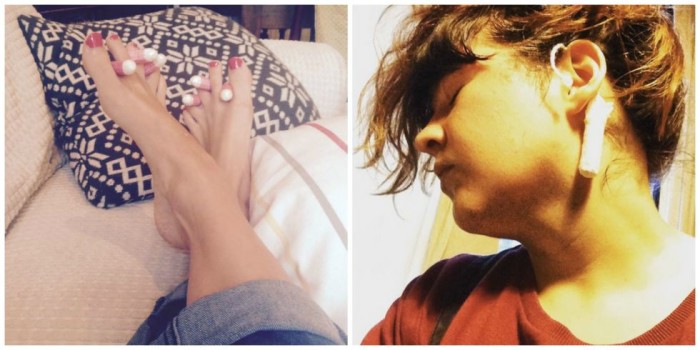Feminism in 2016: Where We Are and What’s Next
When it comes to political, social and economic rights there has never been a better time in history to be a woman. We’re getting there, gradually, but we’re not there yet. And when you begin to look at the figures we’re not even close.
Would it shock you to know that, according to the Global Media Monitoring Project, less than 24% of the people featured on world news are female? Or that women centred stories make up a tiny 10% of news coverage?
Would it surprise you to know that, despite public outrage, the UK government refused to scrap ‘tampon tax’ last year, meaning women still have to pay an extra 5% VAT on this ‘luxury item’, that for half the population, is a monthly necessity?
(Image via)
Mmmm looks relaxing.
At the Women of the World‘s International Day of the Girl event in October 2015, we heard from school girls (some as young as thirteen) who were being subjected to verbal abuse, terms like whore, bitch and slag being thrown at them on a daily basis by their male peers.
Last year, I experienced first hand the consequences of speaking out for women’s rights on social media after I was told to ‘shut up’ and was threatened with violence for tweeting in support of Leslee Udwin’s documentary India’s Daughter.
For the guys the it isn’t great either. Suicide is still the third leading cause of death for young boys in America. Jennifer Siebel Newsom’s second film The Mask You Live In sheds light on the damaging impact of the media on our boys.
These snapshots sound grim but it need not be.
Women in Saudi Arabia were finally given the vote.
The Force Awakens broke world records with a female lead, proving women-led stories can draw in a buck.
2016 will see new legislation take force so that that companies will no longer be able to hide gender pay gaps.
Progress! So what’s next?
(Image via)
Here are 3 ways we can continue to move forwards:
1. Stay informed.
Keep on the pulse of what is going on locally and globally.
The Geena Davis Institute and Women and Hollywood are awesome resources looking at gender in the media.
Women of the World Festival – 8-13th March on London’s Southbank is one for the diary, and will focus on how we can help girls achieve their potential across the board.
Girls Talk London regularly run events aimed at supporting young women in business and in their careers.
Amnesty’s Women’s Action Network will be hosting a FREE screening of Honour Diaries, with Q&A, in London on the 28th of January 2016, taking on the difficult subject matter of FGM and child marriage.
2. Stand in solidarity.
Keep the conversation going, whether it’s amongst your friends, on your blog, on social media…
There is still this lingering myth that feminism is a movement of radical angry ladies marching around burning bras – well, I happen to like my bra thank you very much!
Isolation makes it difficult to speak out about daily sexism but in solidarity positive impact can be made in our communities. Having constructive and productive conversations are the seedlings of change to come, and men are most invited to sit at the table.
In the same way white privilege can be used to counter racism, male-privilege matters when it comes to equality. Thank you Bradley Cooper!
For guys, this might mean calling out sexism amongst peers or, if you are in a leadership position, building an environment within your work or home that is equally nurturing to the men and women in your circle.
Laura Bates’ Everyday Sexism Project remains a platform where women and men can share their experiences anonymously.
3. Write women into history. Literally.
Screenwriting coach Pilar Alessandra encourages us to turn the table on female stereotypes: ‘Don’t ignore negative perceptions about women. Challenge them by turning negative labels into positive traits for your character. ‘Gossipy’ becomes well-informed. ‘Catty’ becomes competitive…’
We don’t need to make a woman more masculine to empower her, but rather adjust how we perceive her.
True in life too!
Geena Davis recently commented that two things Hollywood writers can do to gain more equality on screen is firstly, to go over your project and change the names of male characters to female characters. Secondly, when you write a crowd scene make it clear that crowd is half female.
Currently, only a staggering 17% of characters in crowd scenes are women. True story.
Laura Bates also explains how we can support women in publishing and the arts in her recent post for the Guardian. Worth a gander.
Whether you are a writer or art lover – by showing your interest and support proves there is public demand for more equal representation.
Simple changes – huge difference.
We’d love to hear from you, so please feel free to share with us your thoughts and ideas on how we can make progress.
Have a great week peeps!
If you enjoyed this post, why not check out ‘Feminism for Dudes: Why Guys NEED to Speak Up’?
Tags: Feminism Geena Davis Institute Laura Bates Pilar Alessandra sexism The Force Awakens
Categories: Empowerment: Man! I feel Like a Woman! Fire me up baby! Mirror Mirror: Self Improvement Wise up! Yazmin Joy


2 Comments
This guy is following your recommendation number 2 – standing in solidarity with you all.
Thanks Chris! So great to have your support.